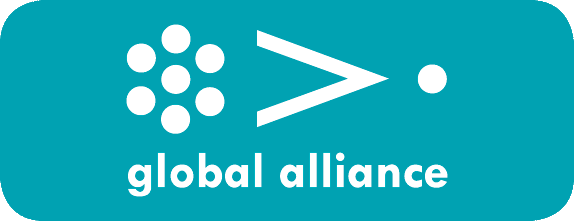Global Capability Framework
The Global Capability Framework is the Global Alliance’s benchmark for how professionals in public relations and communication management perform at their best. It applies to individuals and groups, such as communication departments and the profession as a whole.
The Framework itself is shown below. Developing the framework took two years and required he researchers to examine the aspirations and opinions of practitioners in every continent. The results below show the capabilities that professionals hold in common across the world.
The eleven capabilities are grouped into three areas: the contribution that professionals make because they are communication professionals; the contribution they make to their organisations; and the capabilities which demonstrate professionalism.
Each of these capabilities also have three or four sub capabilities, which explain in more detail what is meant by the main headings. These are given below.
| C A P A B I L I T I E S | S U B C A P A B I L I T I E S |
| To align communication strategies with organisational purpose and values |
You set clear communication objectives that are aligned to organisational objectives and then see them through You act as an architect of communication plans, enacting the purpose, values and policies of the organisation You understand how communication can – and cannot – help an organisation realise its objective |
| To identify and address communication problems proactively |
You create short and long-term narratives to facilitate communication with multiple organisational stakeholders You identify opportunities to design organisational communication, and outline core content You develop integrated communication operations |
| To conduct formative and evaluative research to underpin communication strategies and tactics |
You use research to listen to and understand situations before, during and after communication and relationship-building activities You manage research design, data collection and analysis to improve communication outcomes You establish evaluation systems to demonstrate the impact of communication |
| To communicate effectively across a full range of platforms and technologies |
You have command of communication specialties, such as investor relations, and understand the optimum channels for specific stakeholders You communicate effectively across paid, earned, shared and owned (PESO) channels You have or can source strong written and visual skills to create and tell stories that engage and connect with diverse publics You synthesise complex concepts and convert them to simple, clear and relevant content |
| To facilitate relationships and build trust with internal and external stakeholders and communities |
You identify, analyse and listen to stakeholders and their communication needs You develop stakeholder engagement strategies and partnerships that are mutually beneficial You communicate sensitively with stakeholders and communities across a range of cultural and other values and beliefs |
| To build and enhance organisational reputation |
You identify, analyse and strategically advise on key issues and risks for the organisation You help the organisation to define and enact its purpose and values You help shape organisational culture and its processes You understand and manage key intangible assets (e.g. brand, culture, sustainability) |
| To provide contextual intelligence |
You see the bigger picture - socially, culturally, politically, technologically and economically You identify strategic opportunities and threats, issues and trends You operate in a connected world, demonstrating broad understanding of local and global diversity in culture, values and beliefs |
| To provide valued counsel and be a trusted advisor |
You combine a long term perspective with the agility to manage crises You offer strategic counsel to executive management, particularly regarding the interests of multiple stakeholders You influence organisational decision-making and development You negotiate with empathy and respect for all parties |
| To offer organisational leadership |
You are part of, or have access to, the executive management team and help build internal alliances within the organisation You demonstrate communication leadership by encouraging management based on dialogue You demonstrate business and financial acumen through sound knowledge of the organisation’s business and core processes |
| To work within an ethical framework on behalf of the organisation, in line with professional and society’s expectations |
You consider business objectives in the light of society’s expectations You clarify the consequences of a proposed action on others, ensuring potential outcomes are understood by decision-makers You understand and apply ethical frameworks You recognise and observe the societal obligations of professionals |
| To develop self and others, including continuing professional learning |
You take responsibility for your own continuous professional development, through a range of activities including training and education You participate in industry events, represent the industry in public, and educate others on the role and value of public relations to employers and clients You are able to offer professional guidance which involves, motivates and contributes to personal and team development |
The Global Alliance is grateful to Professor Anne Gregory from the University of Huddersfield in the UK, a former Chair of the Global Alliance, who directed the research and worked with fellow researchers and professional associations in nine countries to develop the Framework. Principal Researcher Dr Johanna Fawkes (UK); Professor Gabriel Sadi (Argentina); Dr Marianne Sison & Dr Katharina Wolf (Australia); Professor Amy Thurlow & Dr Alex Sevigny (Canada); Professor Gregor Halff (Singapore); Professor Elena Gutierrez-Garcia (Spain); Professor Ronel Rensburg (South Africa); Professor Jesper Falkheimer (Sweden); Professor Katerina Tsetsura (USA).


